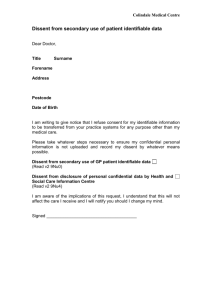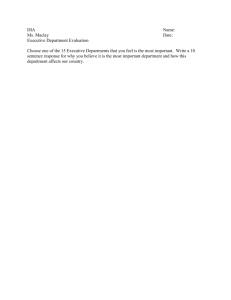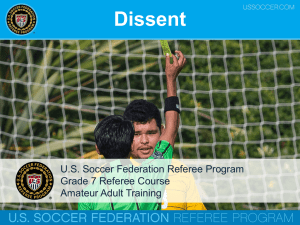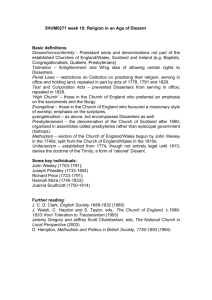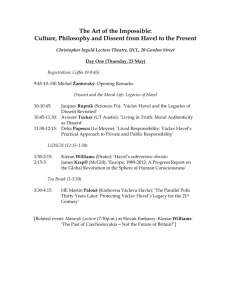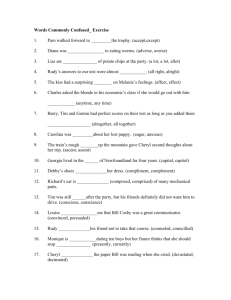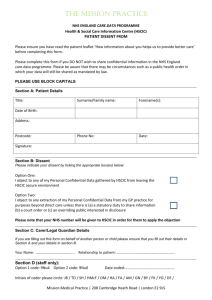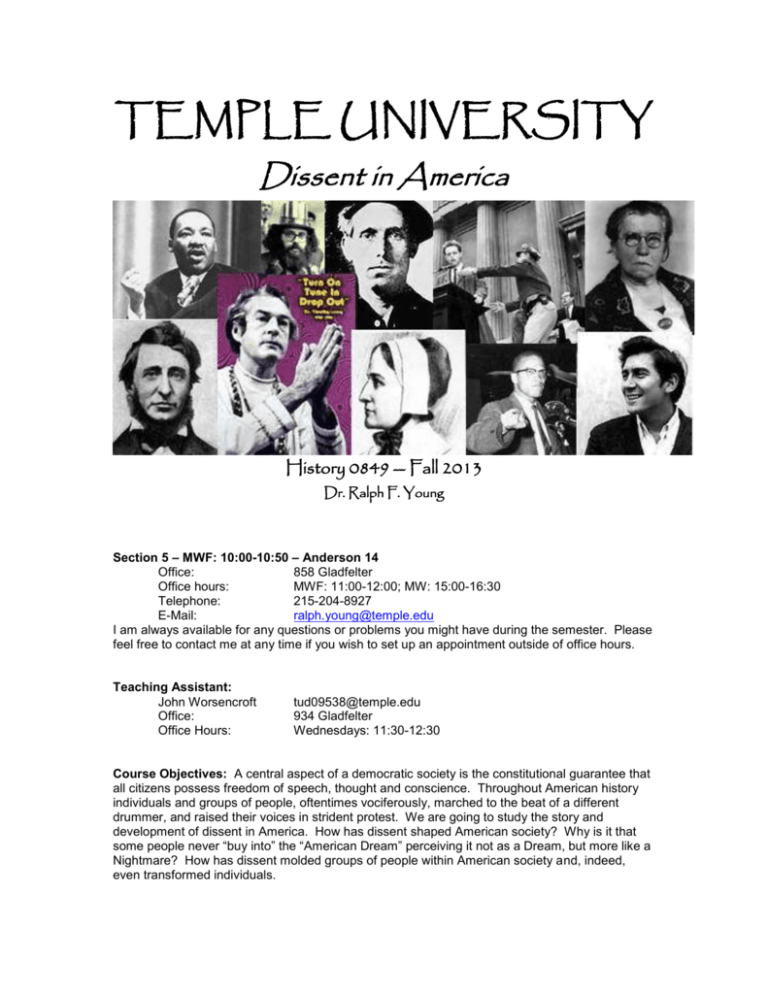
TEMPLE UNIVERSITY
Dissent in America
History 0849 -- Fall 2013
Dr. Ralph F. Young
Section 5 – MWF: 10:00-10:50 – Anderson 14
Office:
858 Gladfelter
Office hours:
MWF: 11:00-12:00; MW: 15:00-16:30
Telephone:
215-204-8927
E-Mail:
ralph.young@temple.edu
I am always available for any questions or problems you might have during the semester. Please
feel free to contact me at any time if you wish to set up an appointment outside of office hours.
Teaching Assistant:
John Worsencroft
Office:
Office Hours:
tud09538@temple.edu
934 Gladfelter
Wednesdays: 11:30-12:30
Course Objectives: A central aspect of a democratic society is the constitutional guarantee that
all citizens possess freedom of speech, thought and conscience. Throughout American history
individuals and groups of people, oftentimes vociferously, marched to the beat of a different
drummer, and raised their voices in strident protest. We are going to study the story and
development of dissent in America. How has dissent shaped American society? Why is it that
some people never “buy into” the “American Dream” perceiving it not as a Dream, but more like a
Nightmare? How has dissent molded groups of people within American society and, indeed,
even transformed individuals.
Areas of concentration:
Dissent during the colonial period: Anne Hutchinson, Roger Williams, Native Americans.
Dissent during the early national period
Abolitionism and Transcendentalism.
Workers’ Rights.
Anti-War Movements.
The Women’s Movement: From Suffragist to Feminist.
The Struggle for Civil Rights.
Cultural Dissent: The rise of a counterculture from Beatniks to Hippies.
Contemporary dissent.
Dissent in America is a US Society Gen/Ed course and as such is geared to develop your
understanding of the history, society, culture and political systems of the U.S. Dissent in
America’s specific aims are to teach you how to interpret historical and cultural materials and
articulate your own point of view about the role dissent has played in American history while
enhancing your:
critical thinking skills
information literacy
ability to examine historical events through a variety of interdisciplinary disciplines
understanding of historical and contemporary issues in context
engagement, both locally and globally, in the issues of our day
Additionally, history courses are designed to develop the many interpretive skills that historians
use. In this course you will be introduced to some of these skills and be expected to become
competent in them. These competencies are fundamental and they will be beneficial to you in
whatever career you pursue:
Construction of simple essay arguments using historical evidence (exhibiting a clear
sense of chronology, using evidence in support of a clearly stated thesis)
Comprehension of time and change (understanding continuity and change over time) and
understanding the connections
Distinguishing between fact and interpretation (recognizing valid historical sources and
their interpretations)
Understanding of internet and digital library resources and other technologically
appropriate sources for research, including ability to determine which are appropriate for
academic use
Evaluation of primary sources in their historical context
Critical analysis of written materials and historical sources and demonstration of ability to
write an analytical historical essay
Class Procedures and Policies: There will be lectures, discussions, in-class analysis of
dissenters’ own words, library and Internet research, occasional quizzes and homework
assignments, and two research papers. We will frequently refer to the documents in the textbook
so always bring it to class. Participation in discussions is expected and will be a factor in your
final grade. Good (can we hope for perfect?) attendance is therefore essential if you expect to do
well. Papers submitted late will be reduced by one grade per day. Missed exams or
quizzes will receive a grade of “F”. Missing 25% of the classes will result in automatic
failure.
Text:
Ralph F. Young, Dissent in America: Voices That Shaped a Nation, Concise Edition,
Pearson/Longman, (ISBN: 978-0205605415, or, ISBN: 978-0205625895)
Disability Statement: This course is open to all students who meet the academic requirements
for participation. Any student who has a need for accommodation based on the impact of a
disability should contact the instructor privately to discuss the specific situation as soon as
possible. Contact Disability Resources and Services at 215-204-1280 in 100 Ritter Annex to
coordinate reasonable accommodations for students with documented disabilities.
Statement on Academic Freedom: Freedom to teach and freedom to learn are inseparable
facets of academic freedom. The University has adopted a policy on Student and Faculty
Academic Rights and Responsibilities (Policy # 03.70.02) which can be accessed through the
following link: http://policies.temple.edu/getdoc.asp?policy_no=03.70.02
Cell Phone/Text Messages: As a matter of common courtesy, please put your phone on “silent”
at the beginning of class (like we do at movie theatres). However, if you must receive either a call
or text message while in class, please pack up your books, exit the room, and respond to your
call or text message. You will be marked as absent for that day.
Blackboard: Blackboard is a valuable resource for this course. Log on at least once a week to
check the announcements, discussions, course materials, links and other information that will be
posted here. The final research project is to be submitted through the Assignments tab on the Bb
page.
Examinations: There will be a midterm and a final consisting of identification and essay
questions.
Library Project: The Temple Library has several valuable databases that you can use for the
library projects: American Periodical Series; African American Newspapers: The 19 th Century;
American Civil War Letters and Diaries; Early American Imprints; Early American Newspapers;
Early Encounters in North America; The Gerritsen Collection; Women’s History Online, 15431945; In the First Person; The Historical New York Times; North American Immigrant Letters &
Diaries; Oral History Online; Pennsylvania Gazette; and Women and Social Movements in the
United States: 1600-2000.
Examine a contemporary newspaper/magazine account of a protest act and analyze how
the dissenter or event was reported at the time. For example, when you read the
account of Susan B. Anthony’s 1873 trial (pages 297-305) you will examine how the trial
was reported by the New York Times, or any other periodical of that period. Does the
newspaper account reveal animosity or support for Susan B. Anthony’s protest? What
does the media account show about contemporary attitudes toward women’s rights?
Dissent in America Library Guide: Temple University Librarian David Murray has created a
“LibGuide” specifically for DiA. This indispensable guide will be very helpful for doing your
research for this course: http://guides.temple.edu/dissent
Documentary Review: Write a 1-2 page evaluation of a documentary that focuses on an
example of dissent. Some suggestions: Fahrenheit 911, Freedom Riders, The Sixties, Two Days
in October, any of the Eyes on the Prize series. Choose the film you want to watch, get approval
from your TA, and then write your report.
Research Project: You will do research and write a 4-6 page paper on a present-day dissent
movement in the Delaware Valley region. First do some library and Internet research on local
protest/activist organizations. These could be antiwar groups, anti-abortion groups, gay rights,
women’s rights, environmental, Green Party, community rights, etc. Choose one of these
organizations (presumably one that you approve of or feel is addressing an important issue) and
do research into the group. Examine its historical roots, present-day activities, explore its
website, and, if you wish, attend a meeting or event or demonstration that the group organizes or
talk to a member of the organization. Report on how effective or ineffective the organization is in
articulating and protesting for its goals. What are the short term goals? What are the long term
goals? Explain why you are critical or laudatory of the group and these goals. Be sure to
analyze the organization within its historical context. Footnotes and a Bibliography must be
used.
Policy on Academic Honesty – According to the Temple University Bulletin:
“Temple University believes strongly in academic honesty and integrity. Plagiarism and academic
cheating are, therefore, prohibited. Essential to intellectual growth is the development of
independent thought and a respect for the thoughts of others. The prohibition against plagiarism
and cheating is intended to foster this independence and respect. Plagiarism is the
unacknowledged use of another person's labor, another person's ideas, another person's words,
another person's assistance. . . . Undocumented use of materials from the World Wide Web is
plagiarism. Academic cheating is, generally, the thwarting or breaking of the general rules of
academic work or the specific rules of the individual courses. It includes falsifying data;
submitting, without the instructor's approval, work in one course which was done for another;
helping others to plagiarize or cheat from one's own or another's work; or actually doing the work
of another person.”
Students must assume that all assignments are to be completed individually unless otherwise
noted in writing in this syllabus. Any case of suspected plagiarism or cheating will be reported to
the University Disciplinary Committee and you will receive a grade of “F”.
Teach Ins: Since 2002 the History Department has held weekly teach-ins every Friday afternoon
from 3:00 to 4:30 in Anderson Hall 821. These teach-ins deal with the historical background of
contemporary domestic problems and foreign policy issues. They provide a great opportunity to
delve into and discuss the most pressing issues confronting our society. They evolved from my
first Dissent in America class and are led by students and faculty. The teach-ins are open to the
public, and all students in “Dissent in America” are encouraged to attend. And please make
suggestions for topics that you would like to see presented or if you would like to lead a teach-in,
get in touch with me and we’ll schedule it. Follow the teach-ins on Facebook:
http://www.facebook.com/group.php?gid=142569935955&ref=mf
Grading:
Class Participation, Quizzes, Homework & Attendance:
Midterm:
Library Project
Documentary Review:
Research Project:
Final Examination:
10%
20%
15%
10%
20%
25%
Topics & Assignments: (dates subject to some modification.)
8/26-8/30
Foundations of Dissent: The European Background
Dissent in Colonial America
Williams, Hutchinson, Dyer, Bacon, Native American Voices, Zenger
Dissent in America, pp. 1-50
9/4-6
“All Men Are Created Equal”?
Woolman, Samuel Adams, Paine, Abigail Adams, Thomas Hutchinson,
Shays, Mason, Murray, Tecumseh
DiA, 39-85
9/9-16
Questioning the New Republic: Indian Resistance, Reformers,
Abolitionists, Feminists, Workers
Frelinghuysen, Ross, Walker, Garrison, Apess, The Grimké Sisters,
Emerson, Fuller, Lowell Mill Girls, Stanton, Douglass, Thoreau, Brown
DiA, 87-141
9/18
Library Research Workshop with Librarian David Murray
9/20
Civil War Dissenters
Vallandigham, Brownlow, Pringle, African American Soldiers, Anthony
DiA, 143-182
9/23-9/30
Dissent in the Gilded Age
Powderly, Chief Joseph, Lease, The People’s Party, Washington,
DuBois, Wells-Barnett
DiA, 183-221
Documentary Review Due 9/30
10/2-7
Progressives and Dissent
Schurz, Jones, Muir, Goldman, Rauschenbusch, Socialist Platform
DiA, 221-244
Mid-term Exam 10/9
10/11-16
Conflict and Depression
Hill, LaFollette, Debs, Bourne, Garvey, Sanger, Mencken, Coughlin,
Long, Guthrie, Dellinger, Yasui
DiA, 245-310
10/18-23
Un-American Activities
Lawson, Smith, Robeson, Hay, Ginsberg
DiA, 311-338
10/25-11/1
Civil Rights
King, Malcolm, Carmichael, Black Panther Party, SDS, Ochs, Dylan
DiA, 339-372
11/4-13
Vietnam and the Counterculture
Savio, Oglesby, Kerry, Leary, Hoffman, Protest Music
DiA, 373-403
11/15-18
Mobilization of Minorities
Redstockings, S.C.U.M., Steinem, Stonewall, AIM
DiA, 403-415
Library Project Due
11/20
11/25-27
Environmentalism, Sexuality, Pacifism, and Militias
ACT UP, Gay Liberation, Hill, Paterson, Kaczynski
DiA, 417-438
11/29-12/6
Contemporary Dissent
Nader, DiFranco, Protest Music, AI, ELF, NION, VAIW, ACLU, MoveOn,
Berg, Sheehan
DiA, 438-478
Research Project Due 12/6
12/13
Final Exam (Friday the Thirteenth): 08:00-10:00

